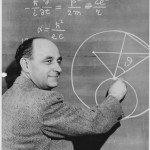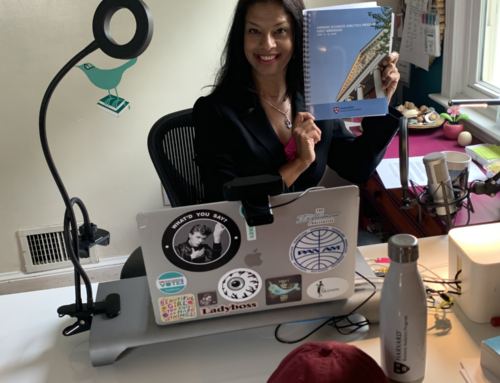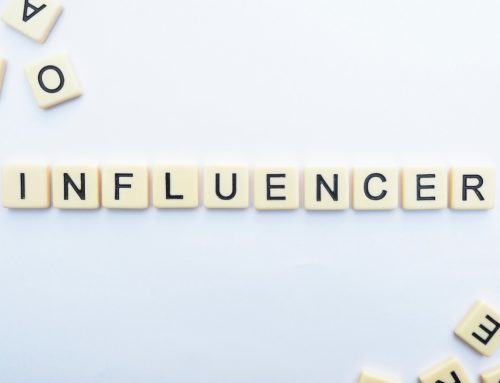 I’ve been dealing with a situation for the past few weeks involving a student who thought she wanted to “ ‘be’ in public relations.”
I’ve been dealing with a situation for the past few weeks involving a student who thought she wanted to “ ‘be’ in public relations.”
That is, until she found out that she was expected to actually do something besides sit at her desk or go to parties.
To quote my hero, Homer Simpson, “D-Oh!”
Those of us who now work or have worked in the public relat
ions profession know there’s a boatload of stuff that comprises the field.
Edward L. Bernays himself, a gazillion years ago (well… 50 years ago), had this to say about the requirements in his book, A Definitive Study of Your Future in Public Relations: “Public Relations does not mean selling a product, an idea, or a personality. Instead, it depends fundamentally on doing – action and deeds that are geared to public understanding and acceptance.”
I write a lot about the subject myself. Don’t claim to be anywhere near the level of Mr. Bernays, but I’ve been around the block a couple of times.
I spend a lot of time in my “Principles of Public Relations” class at Curry College introducing my undergrad Communication students to “my world” and the “R.A.C.E.” formula which defines the process of effective PR planning and programming as comprising research, action, communication, and evaluation.
I tell them, over and over, that public relations doesn’t just happen.
A lot of up-front activity takes place in the planning…“research” and “action”…stages. Then you actually have to do what you say you are going to do (“communication”). Then, when it’s all over (actually, throughout the process), you evaluate the situation to see (a) if anything has changed since you got started, (b) how you did in the end, and (c) what you might want to do differently the next time.
As always, I hasten to add that I realize it’s way more complicated than this makes it sound, but this is a blog post, not the Encyclopedia Britannica.
Successful public relations is about accomplishing a mission…achieving an objective…making something happen that benefits your client or employer.
Successful public relations is not about sitting at your desk and shuffling papers or rubbing elbows with “boldface names” at cocktail parties.
Public relations is a profession with a recurring identity problem, though…one that we who are members of the Public Relations Society of America work diligently to address.
As Ivy Lee, an early and ardent advocate of open and honest public relations, so eloquently stated in his Declaration of Principles: “…our plan is frankly, and openly, on behalf of business concerns and public institutions, to supply the press and public of the United States prompt and accurate information concerning subjects which it is of value and interest to the public to know about.”
In other words, our work as public relations professionals is conducted in the public’s view, open to comment and criticism by all.
Some of the “all” perceive our work as manipulative or downright sneaky. And, sadly, not every single person who practices public relations is squeaky clean…much like any other profession. There are…and always will be…”bad apples.”
But those of us who adhere to the PRSA Code of Ethics abide by the Code’s “Core Values,” and we try hard to impress on others our sincerity and our honesty. I would argue this applies to the vast majority of PR professionals.
What we don’t do, as my young friend apparently thought would be the case, is sit at our respective desks and wait for something to happen. We make it happen!
It’s called the “public relations profession” for a reason.
Image: The U.S. National Archives via Flickr, CC2.0


![[EVENT]: PR Hacks for Small Biz (online)](https://shonaliburke.com/wp-content/uploads/2021/06/FB-Ad-1200x800-01-01-01-Copy-500x383.jpeg)






[…] Kirk Hazlett’s posts, for example, often reinforce the strong customer service element in good public relations and how, while “it’s not rocket science,” it does take hard work. […]
[…] relations…can and should be at the forefront of all success business initiatives. Our value to our organization or client lies in our ability to PRovide advice and counsel at all […]
The first time there was a reality show around PR, I thought to myself, there goes the neighborhood…. I think that was the show around Lizzie Grubman’s firm (did I get that right?). That’s exactly the kind of thing that does nothing to help the profession. I think most sane people know that reality TV is as scripted as most shows, but many people don’t know that… so the “popular” misconception continues to perpetuate. It drives me nuts.
[…] Kirk Hazlett’s posts, for example, often reinforce the strong customer service element in good public relations and how, while “it’s not rocket science,” it does take hard work. […]
Loved this post, Kirk. I wrote on a similar topic earlier this summer after encountering many students who simply didn’t understand what daily life in PR was like: http://mollyborchers.com/2012/06/22/what-working-in-pr-is-really-like/.
MollyBorchers1 Great minds truly do think alike, Molly. Your post is excellent. Thanks for sharing your own thoughts and for reading and commenting on mine!
Hi Kirk, as always thanks for the insight. And can I just tell you that you have NOOOOO idea how serious this “issue” is, I’ve had countless conversations with fellow interns and students who are getting into PR for the WRONG reasons: they want to party, get free stuff, go to fashion week, whatever. It’s frustrating to get lumped in with the “party girls” who see this as “something to do” rather than a dream realized, like some of us do. *Vent Over* lol, thanks for the insight.
Jess_AsPRing Yeah, neither the (fortunately) short-lived “PoweR Girls” nor the long-running “Mad Men” has done us many favors. People, if you want parties and free stuff, be prepared to work for trade for a while, or try becoming a publicist for the jet set (have fun working your way up the ladder fetching skinny double Starbucks crap for picky, spoiled brats while you’re waiting to make it in to all the great parties).
PR isn’t terribly sexy. More often than not you’re the man (or woman) behind the curtain, not the one in front of the camera. As more and more of it becomes measurable, it’s slipping more and more into the social sciences and away from the arts, and though there will always be a home for creatives in PR, they will often find a much more receptive audience on the advertising side. But that’s changing too…
vanhoosear Jess_AsPRing Thanks, Jess and Todd ~ And don’t forget “Sex and the City”! We just have to keep at it, presenting the *professional* face of public relations to both our clients and to those who have absolutely no clue who we are or what we do.
Todd, you make a very valid point…our work isn’t “sexy”…but it can be a heck of a lot of fun when things go the way we plan them!
Onward and upward!!
@KirkHazlett thanks Kirk. I enjoyed the article
@johngrimley Thanks, John.
But I will see you on the cocktail circuit right Kirk? 8)
I decide after working with college interns for a client to assume they are clueless and know nothing about the business world and try to teach them reality. When I was in high school i was a kick ass draftsman and wanted to be an architect. In the third level class they started teaching us physics formulas so I could calculate if a beam can support the right weight or a wall a strong wind. I said ‘You mean I can’t just draw something and then someone builds it?’ and ended my future as an architect. LOL
HowieG Sadly, my day of reckoning, Howie, was “Engineering Drawing I” at Auburn University when I discovered that I was genetically incapable of drawing a straight line with a straightedge. Ergo the transition to English.
We do, indeed, have the constant challenge of explaining to our clients, employers, employees…and our Mothers (sigh) what our profession comprises. I find the dilemma these days to be frustrating rather than, in the olden times, downright annoying. And I refuse to give up!
Thanks for commenting. Next round’s on me!
There have been a few outspoken critics (okay, Jack O’Dwyer) who have done their best to point out that without a licensing process, we may not be a profession in the same way that being a doctor or lawyer is. There ARE certification processes, like the APR. What say you to these critics?
vanhoosear Thanks for the feedback, Todd. I would say to Jack (IF I were to lose my mind and actually speak to him) that licensing has not stopped doctors, lawyers, and any other “profession” from acting unethically or illegally. The responsibility lies squarely on the shoulders of the individual. What the professional societies CAN do…and PRSA is doing a credible job in this area…is educate both its members and the PR professionals stakeholders (clients, media, etc.) on the fact that we have a very comprehensive set of guidelines that illustrate to all what we, as a Society, deem to be ethical conduct. Hope this answers your excellent question!
rt @kmueller62 Public Relations: It’s Called A ‘Profession’ For A Reason http://t.co/NpUwLfsK via @shonali
JohnGrimley Thanks for sharing, John.